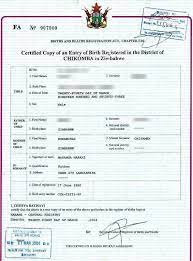A village head from Ward 17 in Bhubhude West, Tsholotsho, Japhet Ndlovu, has highlighted that fear of approaching registry offices is a significant barrier preventing villagers from accessing essential identity documents.
This issue was raised during a meeting organised by the Emthonjeni Women’s Forum, which focused on women’s rights to documentation in Tsholotsho. The forum aims to increase women’s awareness of their citizenship rights by educating them on the requirements, processes, and benefits of obtaining identity documents.
Recently, the government launched a pilot program in Matabeleland North and Manicaland, allowing village heads to issue birth and death confirmation records. Following the meeting, Ndlovu noted that village heads are now better equipped to provide proof letters for villagers seeking primary documentation.
“We have been trained by the Registry to write proof letters for those born at home, enabling them to secure identity documents when they visit Tsholotsho. We are now aware of the steps to take when a child is born outside the country,” he said.
“Most of the time, villagers are afraid of going to the offices, often citing reasons like lack of money. Our involvement will help reduce this barrier and facilitate access to primary documentation,” added Ndlovu.
Ndlovu’s concerns were echoed by Nomanzi Ndlovu, a village health worker in Ward 17, who noted that many undocumented children in the area have returned from South Africa.
“When they come here, they often don’t have fathers with them, and their grandmothers are responsible for their care. They lack the funds to change South African documentation. Many children live without identity documents until they reach the age of five. As village health workers, we don’t discriminate against these children—they receive vaccinations and regular health checks. However, primary documents are still needed in some situations,” she explained.
Due to a lack of documentation, many children cannot participate in school sports or even sit for their Grade 7 examinations.
“As village health workers, it’s distressing for us. We are now collaborating with village heads and local clinics to create a database of undocumented children so that those under the age of five can receive assistance,” she said.
She further added, “Some parents are simply afraid to approach registry offices, or they lack the necessary knowledge. We are appealing for support in Ward 17 to help these children secure their documents.”
Busisiwe Moyo, a 20-year-old from a child-headed household, shared her difficulties obtaining birth certificates for her younger siblings.
“I come from a child-headed family. My parents work in South Africa and only visit for two or three days at a time, making it impossible for them to secure birth certificates for my siblings, who are now 10 years old. Despite having my parents’ birth certificates and IDs, I couldn’t secure birth certificates for my siblings because I was told my parents needed to handle it themselves. My siblings cannot participate in any sports activities at school,” she said.
Moyo added that her siblings also miss out on support from donors who want to assist with their education.
“They are in Grade 4, with only three years left before their Grade 7 exams. Without birth certificates, they won’t be able to write their exams. I hope to get help in securing these documents for them,” she said.
Another villager, Mthelisi Sibanda, spoke about the struggles faced by his two adult grandchildren who lack primary documentation.
“My two grandchildren are now grown up, but they faced many challenges as children. Their grandmother lost their mother’s death certificate, and their paternal grandmother also lost the father’s death certificate. Now, they don’t have any records. When I try to assist them, I’m asked to provide these death certificates, which I don’t have. I am seeking help—where can I go for assistance? These young men are struggling to find employment and are now fathers themselves,” said Sibanda.

